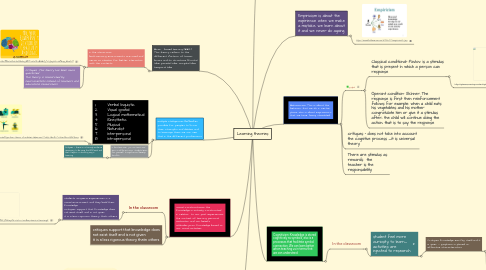
1. Social constructivism: the knowledge is actively constructed in relation to our past experiences, the context of learning personal motivation and our beliefs attitudes prior knowledge based on our social activities
1.1. In the classroom
1.1.1. students acquiere experiences in a social environment and they build their knowledge critiques support that knowledge does not exist itself and is not given it is a less rigorous theory thatn others
1.1.1.1. http://4.bp.blogspot.com/-GnVkmyzB92M/US-CesotCUI/AAAAAAAAAlM/JAdsKUqFh5s/s1600/sundberg-learning-theories.gif
1.2. critiques support that knowledge does not exist itself and is not given it is a less rigorous theory thatn others
2. Social learning theory: learning take place through observation and sensorial experience also is about learning from model and how capable the model seems to be
2.1. SLT in the classroom
2.1.1. – collaborative in group –modeling responses and expectation
2.2. in the classroom experts are presented at schools, so that students learn from them _high responses and expectations of competente modell are created
2.2.1. critiques _ individuality, context and experiences are not important
2.2.1.1. https://www.paradisosolutions.com/blog/wp-content/uploads/2014/09/banner-3.jpg
3. multiple intelligences (MI)Makes possible for peoples to know their strengths and abilities and to leverage them we can see that in the different professions
3.1. 1. Verbal linguistic 2. Visual spatial 3. Logical mathematical 4. Kinesthetic 5. Musical 6. Naturalist 7. Interpersonal 8. Intrapersonal
3.1.1. https://www.verywellmind.com/thmb/GDVFDqytQQE7rxsabxvlqzbij_o=/1500x1000/filters:no_upscale()/gardners-theory-of-multiple-intelligences-2795161-5bcdfc7046e0fb0051fb2311.png
3.2. in the classroom _ you can teach and learn in different ways _ students learn for yourself, to improve and develop the skills
3.2.1. Critiques _ there is not enough evidence necessary to be sure that (MI) exist and that it helps in a shocking way in Learning
4. Brain – based learning (BBL) This theory refers to the different Funtions of human brains and its structure (frontal lobe, parietal lobe, occipital lobe temporal lobe
4.1. In the classroom Multi-sensorg environments are used and serve as stimulus for better interaction with the contents.
4.1.1. https://encrypted-tbn0.gstatic.com/images?q=tbn:ANd9GcRmLdSMKxdSQXN8TSg298kWBUBFQTrCybQhV5naXAbUgq-bdsxFvA
4.1.2. Critiques -This theory has been much questioned This theory is researched by neuroscientists instead of teachers and educational researchers
5. Rationalism: refers to the idea that knowledge derives from reason without recourse to the sense also we adquired knowledge endure reflecting upon them.
5.1. http://4.bp.blogspot.com/-OBJcMi6DjEQ/Ts6evLcXEwI/AAAAAAAAEDU/fWlBGW2Oz3E/s1600/be-rational-get-real.png
6. Behaviorism: This is about the behavior that we do in certain place, also is about expressions that we have being stimulated.
6.1. English
6.1.1. Classical conditional- Pavlov: is a stimulus that is present in which a person can response
6.1.1.1. http://aplusac1.com/wp-content/uploads/parser/classical-conditioning-experiments-1.jpg
6.1.2. Operant condition- Skinner: The response is first then reinforcement follows for example: when a child eats his vegetables and his mother congratulate him or give it a stimulus after, the child will continue doing the action, that is to say the response
6.2. critiques - does not take into account the cognitive process _it is universal theory
6.3. There are stimulus as rewards the teacher is the responsability
7. Cognitivism: Knowledge is stored cognitively as symbols, also is a processes that facilitate symbol connection. We can learn better when teaching us in terms that we can understand
7.1. In the classroom
7.1.1. student feel more curiosity to learn_ activities are injected to research
7.1.1.1. Critiques knowledge exist by itself,and it is given _ Emphasis is placed on effective characteristics
7.1.1.1.1. http://impactofspecialneeds.weebly.com/uploads/3/4/1/9/3419723/9202520.jpg?420

